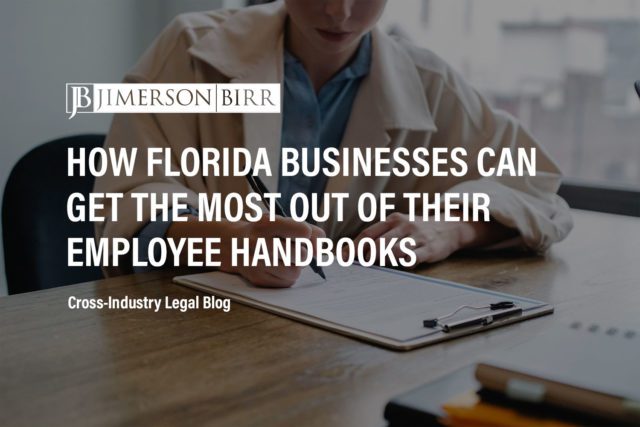What do health and welfare benefit plans encompass?
Health and welfare benefit plans cover various employer-sponsored benefits aimed at promoting employee health and well-being. These plans include medical, dental, vision, and prescription drug coverage, along with disability and life insurance, and additional fringe benefits.
A common example is the group health plan offered by employers under the Affordable Care Act (ACA). Employers with 50 or more full-time employees are obligated to provide affordable health insurance meeting minimum essential coverage standards. Failure to comply may result in penalties under the ACA’s employer-shared responsibility provisions.
Need help with training, compliance, or litigation to protect your workplace? Schedule your consultation today with a top employment law attorney.
Which laws, rules, and regulations apply to health and welfare benefit plans?
Various laws, rules, and regulations govern health and welfare benefit plans in Florida, ensuring compliance and protecting the rights of employees. These include:
- Employee Retirement Income Security Act (ERISA): Federal legislation overseeing the administration of employee benefit plans, setting minimum standards, and mandating information disclosure to plan participants.
- Affordable Care Act (ACA): Establishes requirements for employer-provided health insurance, encompassing minimum essential coverage, affordability, and reporting mandates.
- Consolidated Omnibus Budget Reconciliation Act (COBRA): Requires employers with 20 or more employees to offer continued health coverage for a limited period to those facing specific qualifying events.
- Health Insurance Portability and Accountability Act (HIPAA): Regulates the privacy and security of protected health information, addressing portability and non-discrimination in health coverage.
- Florida Insurance Code: State-level regulation overseeing the insurance industry in Florida, including health insurance, with provisions impacting health and welfare benefit plans.
What are common issues associated with health and welfare benefit plans that lead to litigation against employers?
In the realm of Florida employment law, several legal pitfalls associated with health and welfare benefit plans commonly lead to litigation:
- Denial of Benefits: Disputes may arise when employers deny benefits, sparking disagreements with employees who believe they are entitled to them.
- Inaccurate Plan Information: Miscommunication or lack of transparency in plan descriptions can result in misunderstandings and disputes.
- Discrimination in Benefits: Allegations of discrimination may surface, with employees claiming unequal treatment based on factors like age, disability, or race.
- COBRA Violations: Employers failing to provide required continuation of health coverage under COBRA may face legal consequences.
What are the prerequisites to file a lawsuit regarding health and welfare benefit plans, and what legal defenses may employers assert?
Before initiating a lawsuit related to health and welfare benefit plans, employees must fulfill specific prerequisites:
- Exhaustion of Administrative Remedies: Pursue internal remedies provided by the plan before filing a lawsuit.
- Standing: Demonstrate a legally protected interest in the plan and prove harm resulting from the alleged violation.
- Timeliness: File claims within the applicable statute of limitations for ERISA and other relevant laws.
Employers may employ various legal defenses against claims arising from health and welfare benefit plans:
- Statute of Limitations: Argue that the employee’s claim is time-barred due to the expiration of the applicable statute of limitations.
- Safe Harbor Provisions: Claim protection under safe harbor provisions of relevant laws, such as ERISA or ACA, shielding them from liability.
- Employee’s Failure to Meet Plan Requirements: Assert that the employee did not fulfill the plan’s eligibility or participation requirements.
To determine whether your unique situation may necessitate litigation or another form of specialized advocacy, please contact our office to set up your initial consultation.
What measures must employers take to legally comply with health and welfare benefit plans?
To adhere to the legal requirements surrounding health and welfare benefit plans in Florida, employers must implement several measures:
- Provide Clear Plan Information: Furnish transparent and accurate plan descriptions, outlining eligibility criteria, benefits, and coverage terms.
- Ensure Non-Discriminatory Practices: Treat all employees equally and without discrimination when offering and administering health and welfare benefit plans.
- Adhere to COBRA Requirements: Fulfill obligations to provide continuation of health coverage when required under COBRA.
- Comply with ERISA and ACA Provisions: Follow the provisions of the Employee Retirement Income Security Act (ERISA) and Affordable Care Act (ACA) relevant to health and welfare benefit plans.
Please contact our office to set up your initial consultation to see what forms of legal advocacy or intervention may be available for your unique situation.
Frequently Asked Questions
Can an employer change or terminate a health and welfare benefit plan without notice?
While employers generally have the right to amend or terminate benefit plans, they must comply with specific notice requirements set forth in ERISA.
Are part-time employees entitled to health and welfare benefit plans?
Employers have discretion in offering health and welfare benefit plans to part-time employees; however, the ACA requires employers to offer coverage to full-time employees and their dependents.
What actions can employees take if they believe their health and welfare benefit plan rights have been violated?
Employees can file complaints with the Department of Labor or consult with an attorney to explore potential legal remedies, including litigation.
Have more questions about employment law training, compliance, or litigation?
Crucially, this overview of health and welfare benefit plans does not begin to cover all the laws implicated by this issue or the factors that may compel the application of such laws. Every case is unique, and the laws can produce different outcomes depending on the individual circumstances.
Jimerson Birr attorneys guide our clients to help make informed decisions while ensuring their rights are respected and protected. Our lawyers are highly trained and experienced in the nuances of the law, so they can accurately interpret statutes and case law and holistically prepare individuals or companies for their legal endeavors. Through this intense personal investment and advocacy, our lawyers will help resolve the issue’s complicated legal problems efficiently and effectively.
Having a Jimerson Birr attorney on your side means securing a team of seasoned, multi-dimensional, cross-functional legal professionals. Whether it is a transaction, an operational issue, a regulatory challenge, or a contested legal predicament that may require court intervention, we remain tireless advocates at every step. Being a value-added law firm means putting the client at the forefront of everything we do. We use our experience to help our clients navigate even the most complex problems and come out the other side triumphant.
If you want to understand your case, the merits of your claim or defense, potential monetary awards, or the amount of exposure you face, you should speak with a qualified Jimerson Birr lawyer. Our experienced team of attorneys is here to help. Call Jimerson Birr at (904) 389-0050 or use the contact form to schedule a consultation.
Here are some blogs written by JB attorneys that provide more information about employment law:
- Independent Contractor or Employee: Know the Difference (jimersonfirm.com)
- Rescinding Job Offers in At-Will Employments in Florida | Jimerson Birr (jimersonfirm.com)
- Tips for Drafting Employee Handbooks in Florida | Jimerson Birr (jimersonfirm.com)
- Understanding The EEOC Process: Employee Sexual Harassment And Sexual Discrimination Claims In The Era Of #MeToo (jimersonfirm.com)
- Contesting OSHA Violations and OSHA Citations: A Guide To OSHA Employer Rights (jimersonfirm.com)
- What Do Contractors Need to Know About Employee Duty of Loyalty and Ability to Compete | Jimerson Birr (jimersonfirm.com)

We live by our 7 Superior Service Commitments
- Conferring Client-Defined Value
- Efficient and Cost-Effective
- Accessibility
- Delivering an Experience While Delivering Results
- Meaningful and Enduring Partnership
- Exceptional Communication Based Upon Listening
- Accountability to Goals











